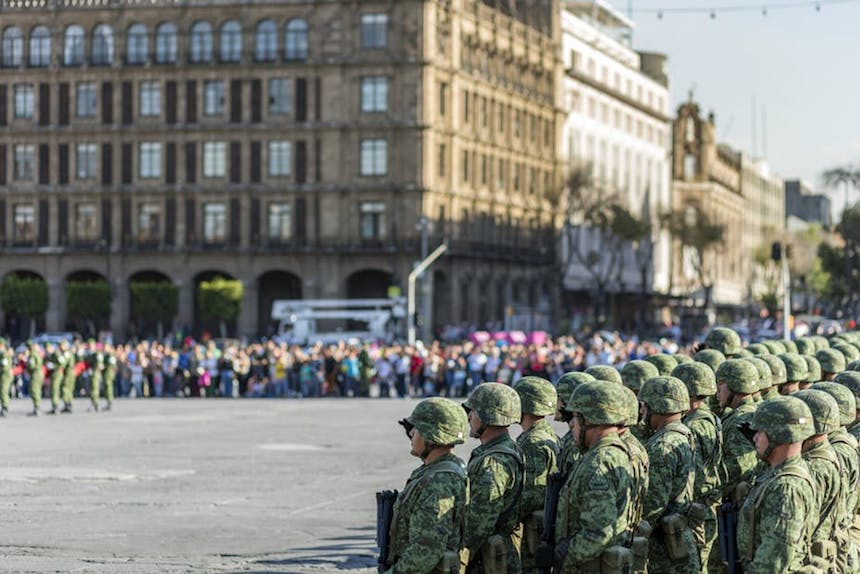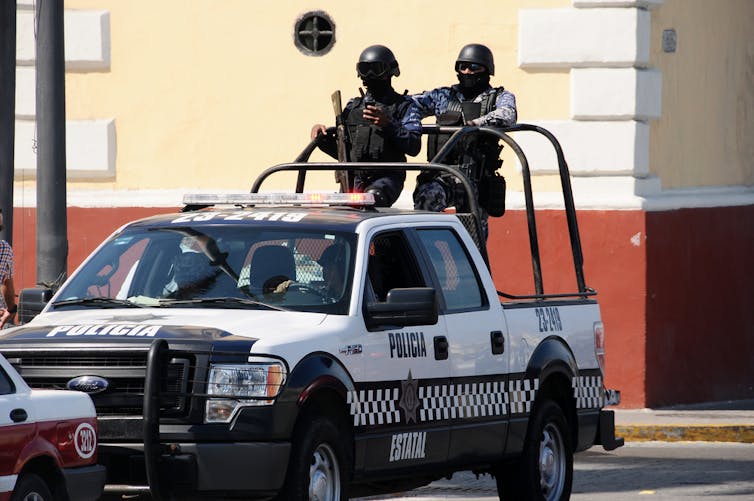 While the main mission of the Mexican Armed Forces (army, air force and navy) is to safeguard national security, Mexico is faced with very few direct foreign threats. Consequently, the armed forces instead focus most of their attention on internal threats: emergency response to natural disasters, and temporary operations for countering organized crime.
While the main mission of the Mexican Armed Forces (army, air force and navy) is to safeguard national security, Mexico is faced with very few direct foreign threats. Consequently, the armed forces instead focus most of their attention on internal threats: emergency response to natural disasters, and temporary operations for countering organized crime.
Successive Mexican presidents have continuously relied on the well-armed and highly respected armed forces to combat the large and powerful organised crime groups (colloquially known as “cartels”) that dominate the Latin American drug trade.
They have done it for two reasons. On the one hand, local and state police forces have been neglected for decades and have been unable to cope with the corruptive influence of criminal groups. On the other, federal police forces have been too weak and small to counter the national presence of powerful cartels. So when faced with a rising death toll and increasingly violent organized crime groups, presidents have had few alternatives but to turn to the military.
Until a decade ago, these interventions were rather sporadic. The most dramatic upsurge came about in 2006, when then-president Felipe Calderón (2006-2012) declared an all-out war on organised crime.
While the decade-long strategy was successful in breaking apart the main organised crime groups, violence induced by splinter groups and new actors has not abated.
The strategy has plunged the country into an ongoing conflict that has cost thousands of lives. Furthermore, it has also provoked countless human rights violations by the security forces (including the military) in the form of torture, extrajudicial killings and forced disappearances, and has led to an explosion in criminality in both petty and serious crime, such as kidnapping and extortion.
President Peña Nieto (in office since 2012) has sought to scale back the focus of the Calderón government’s war on organised crime. This led to an illusory lull in homicide trends for the first couple of years of his term, only for violence to return with a vengeance: October 2017 was Mexico’s deadliest month on record.
Around the tenth anniversary of the war on organised crime, Mexico’s secretary of defence complained about the lack of a proper legal framework for the involvement of the armed forces in “matters of internal security”, including the fight against organised crime. Such criticism was echoing a 2012 statement by a minister of the Supreme Court, who said that the constitution did not empower the army to take on roles attributed to civil law enforcement agents.
The Internal Security Law
To fill this legal vacuum, legislators proposed an Internal Security Law, approved on November 30 by the Chamber of Deputies (Mexico’s lower house of congress), with support from the governing PRI party and a few PAN deputies (the largest opposition party). The bill set to now be debated (and probably approved) by the Senate seeks to regulate the involvement of the armed forces in “threats to internal security”. Such interventions would have to be requested by state governments, or could be initiated by the president if the threats are deemed to be urgent.
 The police are struggling to contain a wave of violent crime.
The police are struggling to contain a wave of violent crime.
Shutterstock
Proponents of the law note that such “actions of internal security” are never supposed to substitute local law enforcement; are bound to respect human rights; are to be deployed only against specific threats for a limited time (though subject to extensions); are explicitly forbidden to be used against peaceful social and political protests; and should involve the military only if the Federal Police cannot deal with the threat.
Nevertheless, the proposed law has been met with wide opposition from civil society organisations, academics, and international organisations such as the United Nations Office of the High Commissioner for Human Rights, Human Rights Watch, and Amnesty International.
Critics claim that given the country’s poor track record in punishing human rights abuses by the military, institutionalising their role in law enforcement could lead to more abuse. Furthermore, they argue that the vague definition of “threats to internal security” gives too much discretion to the president, prompting fears that the military might be deployed as a tool of political repression. They also complain that the law rolls back accountability and transparency, as all information related to such interventions would be automatically classified as state secrets.
It’s about trust
It is true that there is a legal void regarding the involvement of the armed forces in internal threats. Such participation of the military in civilian life is not exclusive to Mexico. Liberal democracies increasingly resort to the military in support of internal security missions, including in the UK and France, for example. The question is how, and to what extent.
The proposed law does attempt to regulate such involvement in principle, however it does little more than state in law what already takes place in practice. Not surprisingly, this raises legitimate fears that it will only lead to a perpetuation of the status quo at the expense of developing capable local civil law enforcement institutions.
![]() A truly beneficial law on internal security, if any, would go to greater lengths to curb the executive’s use of the armed forces to deal with internal security problems, for example by mandating stricter mechanisms for oversight (including legislative and judicial control) and by defaulting the interventions at their most restrictive setting, rather than leaving their terms to executive discretion.
A truly beneficial law on internal security, if any, would go to greater lengths to curb the executive’s use of the armed forces to deal with internal security problems, for example by mandating stricter mechanisms for oversight (including legislative and judicial control) and by defaulting the interventions at their most restrictive setting, rather than leaving their terms to executive discretion.
Patricio R. Estévez-Soto, PhD Candidate in Security and Crime Science, UCL and David Perez Esparza, PhD Candidate in Security and Crime Science at University College London (UCL), UCL
This article was originally published on The Conversation. Read the original article.


